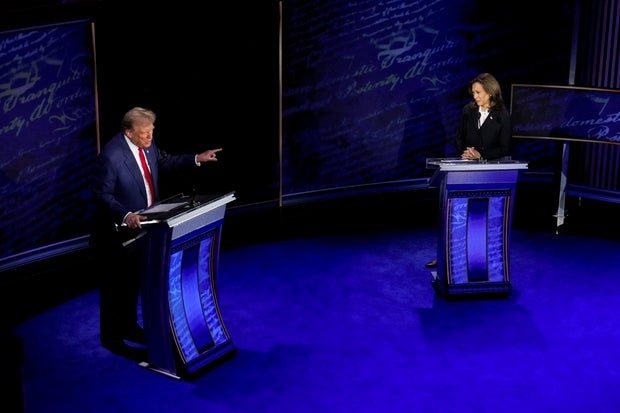Washington — The Russian invasion of Ukraine over two years ago rocked the international world order, and it’s become one of the most divisive issues of the 2024 presidential election. Republican nominee Donald Trump and Democratic nominee Kamala Harris advocate very different approaches to involvement in the war and the U.S. relationship with Russian President Vladimir Putin.
While the GOP has become increasingly isolationist with Trump at the helm of the party, Harris has touted the Biden administration’s efforts to strengthen global alliances. And on the issue of Ukraine, the parties have drifted farther apart on how much support the U.S. should be giving to the war-ravaged country more than two years later.
Here’s where the candidates stand on the issue:
Donald Trump on the Russia-Ukraine war
The former president attempted to build friendly relations with Russia while in office and has often praised Putin, calling him “savvy” after the Russian leader recognized the independence of two Russian separatist-controlled areas in eastern Ukraine ahead of the invasion. More recently, Trump has suggested he would not protect NATO members from Russia if they don’t increase defense spending. And he has repeatedly raised questions about U.S. membership in NATO.
On Ukraine, Trump has claimed Putin would never have invaded the country if he were president. And he has frequently claimed he could end the war in a day and would bring Ukraine to the negotiating table. Trump hasn’t said how he plans to do this, but experts think he’d force Ukraine to negotiate an end to the war by denying continued aid.
During the presidential debate with Harris in September, Trump wouldn’t say whether he wanted Ukraine to win in its war with Russia when he was asked, instead responding, “I want the war to stop,” and urging the two countries to negotiate a deal.
“What I’ll do is I’ll speak to one, I’ll speak to the other, I’ll get them together,” Trump said. “That war would have never happened.”
Trump spoke to Ukrainian President Volodymyr Zelenskyy over the phone in July, in what the former president described as a “very good phone call.” He pledged in a social media post after the call that under his presidency, Ukraine and Russia “will be able to come together and negotiate a deal that ends the violence and paves a path forward to prosperity.” A phone conversation between the two leaders nearly five years earlier led to Trump’s first impeachment, when Trump pushed for Zelenskyy to investigate his political rival Joe Biden and his son Hunter.
The former president has been critical of the Biden administration for sending billions of dollars in aid to Ukraine. When the aid became a key issue in Congress earlier this year, with growing opposition from conservatives, Trump himself pushed for a loan framework for aid to Ukraine. At a rally in June, he suggested aid to Ukraine could stop if he returned to office. And his running mate, Ohio Sen. JD Vance, has been vocal about the GOP ticket’s opposition to additional Ukraine aid.
Trump’s campaign website touts the former president’s “bold diplomacy” as part of a pledge to “reject globalism and embrace patriotism,” while working to “restore our standing in the world and American leadership abroad” under a second Trump presidency.
Kamala Harris on the Russia-Ukraine war
Harris, whose record is shorter than Trump’s but has been associated with the Biden administration’s policies, pledged in her address at the Democratic convention in August that she “will stand strong with Ukraine and our NATO allies.”
President Biden sent the vice president to meet with Zelenskyy on the sidelines of the Munich Security Conference a few days before the Russian invasion, warning the Ukrainian leader of the Kremlin’s plan and sharing American intelligence that suggested the invasion was imminent as Russian troops massed on Ukraine’s border. A year later, Harris accused Russia of committing “crimes against humanity.” And she’s met with the Ukrainian leader on multiple occasions since.
The Biden administration has spearheaded a number of humanitarian and military aid packages for Ukraine and worked with allies to sanction Russia for its invasion. Still, the administration’s response — especially early on in the war — has been criticized as slow-moving, while Republican opposition in Congress further slowed aid to Ukraine more recently.
During the debate, Harris touted her work in the Biden administration to support Ukraine, warning that if Trump were still president, “Putin would be sitting in Kyiv right now.”
“Understand why the European allies and our NATO allies are so thankful that you are no longer president and that we understand the importance of the greatest military alliance the world has ever known,” Harris said to Trump, “and what we have done to preserve the ability of Zelenskyy and the Ukrainians to fight for their independence.”
Harris’ campaign website dubs her a “tireless and effective diplomat on the world stage,” pledging that she will stand up to dictators. It cites her meeting with Zelenskyy before the war began, and it boasts that Harris has “helped mobilize a global response of more than 50 countries to help Ukraine defend itself against Vladimir Putin’s brutal aggression,” while working with allies to bolster NATO’s strength.

